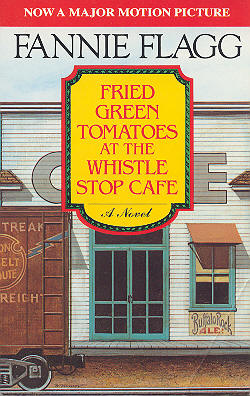Fried Gree Tomatoes at
the Whistle Stop Café
Fannie Flagg

This month, your editor / book reviewer turns to an old favorite, one that several of you may have read. However, it's probably new to some, so we're off on a brief visit to the town of Whistle Stop, AL. The time period ranges from the era of the Great Depression to the 1980s, and the book is, of course, Fried Green Tomatoes at the Whistle Stop Cafe, by Fannie Flagg.
The novel's narrator, Mrs. Cleo Threadgoode, is a born storyteller. She relates the saga of her life in the small town of Whistle Stop to Evelyn Couch, a visitor to the nursing home where Mrs. Threadgoode lives. Evelyn is a depressed woman in her mid-forties, while Mrs. Threadgoode is still full of life, and offers many suggestions and practical advice to Evelyn to help her make it through the mood swings that have hit her with the onset of menopause.
"Evelyn asked Mrs. Threadgoode if she ever got depressed.
Mrs. Threadgoode answered truthfully. "No, honey, I cain't say I have been lately, I've been too busy being grateful for His blessings – why, I've had so many blessings I cain't even count them. Now, don't get me wrong, everybody's got their sorrows, and some more than most."
"But you seem so happy, like you never had a care in the world."
Mrs. Threadgoode laughed at the thought. "Oh honey, I've buried my share, and each one hurt as bad as the last one. And there have been times when I've wondered why the good Lord handed me so many sorrowful burdens, to the point where I thought I just couldn't stand it one more day. But He only gives you what you can handle and no more...and I'll tell you this: You cain't dwell on sadness, oh, it'll make you sick faster than anything in this world."
Evelyn said, "You're right. I know you're right. Ed said maybe I should go and see a psychiatrist or something."
"Honey, you don't need to go and do that. Anytime you want to talk to someone, you just come and see me. I'd be happy to talk to you. Be more than happy to have the company."
"Thank you, Mrs. Threadgoode, I will." She looked at her watch. "Well, I'd better go, Ed's gonna be mad at me."
Whistle Stop, as described by Mrs. Threadgoode in flashback style, is a small but bustling place outside of Birmingham, full of colorful characters, where neighbors always lend a hand to one another, regardless of color or economic status. One of the central figures in the town is Idgie (christened Imogene) Threadgoode, the younger sister-in-law of Mrs. Threadgoode. Idgie is a practical joker of no common order, and a teller of very tall tales.
"Ninny," Idgie said, "catfish don't bite in the dead of winter."
"They don't? Well, you'd think they would be just as hungry in the winter as they are in the summer, wouldn't you?"
Ruth agreed. "That's true, Idgie. Why don't they bite this time of year?"
"Oh, it's not that they aren't hungry, it has to do with the temperature of the worm. A catfish won't eat a cold worm, no matter how hungry it gets."
Ruth looked at Idgie and shook her head, always amazed at the tales Idgie could come up with.
Ninny said, "Well, that makes sense. I hate my food to get cold, myself, and I guess even if you were to heat up the worms, they would be cold by the time they got to the bottom of the river, wouldn't they? And speaking of cold, hasn't it been a cold old winter? It's as cold as blitzen out there."
Fannie Flagg's story of Whistle Stop and its inhabitants is funny and poignant by turns, entertaining and even thought-provoking. It's a keeper, a book to enjoy more than once. Be sure to read all about it!
All Rights Reserved.